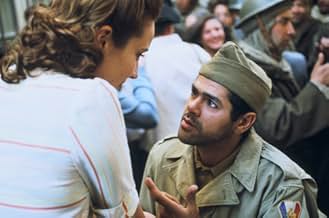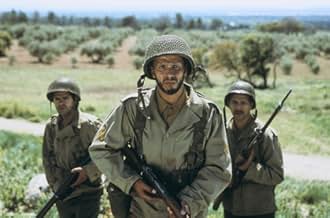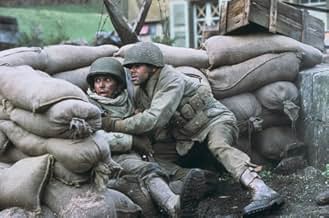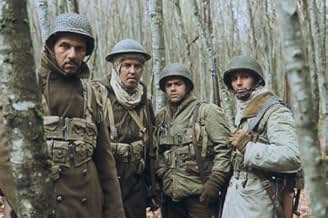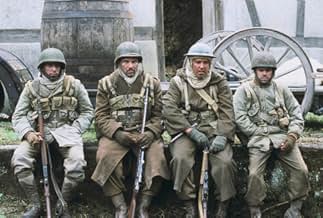AVALIAÇÃO DA IMDb
7,0/10
15 mil
SUA AVALIAÇÃO
Adicionar um enredo no seu idiomaDuring World War II, four North African men enlist in the French army to liberate that country from German oppression, and to fight French discrimination.During World War II, four North African men enlist in the French army to liberate that country from German oppression, and to fight French discrimination.During World War II, four North African men enlist in the French army to liberate that country from German oppression, and to fight French discrimination.
- Direção
- Roteiristas
- Artistas
- Indicado a 1 Oscar
- 9 vitórias e 17 indicações no total
- Direção
- Roteiristas
- Elenco e equipe completos
- Produção, bilheteria e muito mais no IMDbPro
Avaliações em destaque
The movie takes the viewer on a trip back to the second world war, showing how parts of the Arabic population fought with the French colonists for their freedom, against Nazi Germany trying to occupy Africa. As the movie evolves, other aspects than the fight for freedom and the brutality of war emerges. The viewer is reminded that the the social identity of the white bourgeoisie class and the stereotypes that follows not emerged with the current world of terrorism. Questions of power, humanity, religion, racism, love and honour follows the viewer through this exciting, emotional and realistic movie. Along with the plot and acting in this piece of work, the critical viewer should be satisfied.
So you've done a great piece of work, and are awaiting your just rewards. Somehow along the way, someone else, by colour, creed, or connections, get all the recognition that you're due credit for. You feel frustrated, but you think of your rice bowl, and decide to grit your teeth and bear it, calling it just another day, secretly longing for a time where you are empowered to do something about it.
In the liberation of France during WWII, North African men were recruited and enlisted in the French army in the fight against the Nazis. Why do they do it? One reason is to escape poverty, and the holding on to the glimmer of hope that they can be accepted, when the war is over, as equals based on their fight for the "motherland". These soldiers, mujahedeens, fought hard, often being in the frontline, but always overlooked when it comes to recognition of basic military welfare and promotions, not that these rewards will cost an arm or a leg, nor are the fighters so hard up for them. All they're asking for was fair treatment, but all they got was discrimination.
Yes, and that is the pain. WWII movies are aplenty, but Days of Glory offered a unique look at the battles by a group of men, for what they deem their motherland and will defend with their blood, and what more, for a land of people who do not see them as equals. Loving someone who does not love you back, sounds familiar? And it's not just love, but sworn allegiance to protect at all costs.
The movie is well paced and straddled moments of action and quiet contemplation with aplomb. Credit must go to the ensemble cast of actors who play the warriors of North Africa, as they battle both the enemies on French soil, as well as enemies of men's heart. They grapple with trying to remain rational in their reason(s) to do what they're doing.
At times, watching this movie made me think about the recent flurry of mails to the press about foreign talent and the issue of citizenship, about NS obligations and whether PRs will flee at the first signs of trouble, or stand shoulder to shoulder with citizens (also, who are those who will flee?) in defending our land. What are the issues of contention, discrimination against, or general presumptions about foreigners here?
Those expecting all out battle scenes might be disappointed. In truth the movie's never about the glorification of gore, violence and war - most scenes aren't really blood splattering to draw in the crowds. Instead, if you'd prefer moments where you can think out loud about the issues presented, then this is for you. However, the final battle would please action fans, as it is well choreographed and executed, and you feel both the pain and victory from a bunch of tightly knit soldiers trying their very best to defend a small town, in a samurai- seven-ish sort of way, also reminiscent of Saving Private Ryan's somehow.
If you've missed this during the French Film Festival, don't fret. I believe this movie is also slated for general release. Keep a look out for it!
In the liberation of France during WWII, North African men were recruited and enlisted in the French army in the fight against the Nazis. Why do they do it? One reason is to escape poverty, and the holding on to the glimmer of hope that they can be accepted, when the war is over, as equals based on their fight for the "motherland". These soldiers, mujahedeens, fought hard, often being in the frontline, but always overlooked when it comes to recognition of basic military welfare and promotions, not that these rewards will cost an arm or a leg, nor are the fighters so hard up for them. All they're asking for was fair treatment, but all they got was discrimination.
Yes, and that is the pain. WWII movies are aplenty, but Days of Glory offered a unique look at the battles by a group of men, for what they deem their motherland and will defend with their blood, and what more, for a land of people who do not see them as equals. Loving someone who does not love you back, sounds familiar? And it's not just love, but sworn allegiance to protect at all costs.
The movie is well paced and straddled moments of action and quiet contemplation with aplomb. Credit must go to the ensemble cast of actors who play the warriors of North Africa, as they battle both the enemies on French soil, as well as enemies of men's heart. They grapple with trying to remain rational in their reason(s) to do what they're doing.
At times, watching this movie made me think about the recent flurry of mails to the press about foreign talent and the issue of citizenship, about NS obligations and whether PRs will flee at the first signs of trouble, or stand shoulder to shoulder with citizens (also, who are those who will flee?) in defending our land. What are the issues of contention, discrimination against, or general presumptions about foreigners here?
Those expecting all out battle scenes might be disappointed. In truth the movie's never about the glorification of gore, violence and war - most scenes aren't really blood splattering to draw in the crowds. Instead, if you'd prefer moments where you can think out loud about the issues presented, then this is for you. However, the final battle would please action fans, as it is well choreographed and executed, and you feel both the pain and victory from a bunch of tightly knit soldiers trying their very best to defend a small town, in a samurai- seven-ish sort of way, also reminiscent of Saving Private Ryan's somehow.
If you've missed this during the French Film Festival, don't fret. I believe this movie is also slated for general release. Keep a look out for it!
I did not know what to expect from this movie starring guys like Djamel Debbouzze or Samy Naceri, more used to non sense jokes and wrong way taxi driving, but I must say I was astonished.
First pictures are beautiful, dialogs and pace slow but efficient.
Second the way the four main characters perform is great (although Naceri is maybe not quite as good as the three others). All moved by different motivations, they have a sole dream: to be a real part of it, a part of the French country they have been fighting for. And they make you believe it. Not only because they fit perfectly into their roles, but also because the suffering and the inequalities they undergo in the war fields of the movie still exist six decades after in their every day life.
"All animals are equal, but some are more equal than others". True it was in Provence or in Alsace, true it is in today's France.
To me this film is more than the French Private Ryan, it is a subtle way to ask: "how much more is it going to take before we can all be on the same boat ?" Go and see it.
First pictures are beautiful, dialogs and pace slow but efficient.
Second the way the four main characters perform is great (although Naceri is maybe not quite as good as the three others). All moved by different motivations, they have a sole dream: to be a real part of it, a part of the French country they have been fighting for. And they make you believe it. Not only because they fit perfectly into their roles, but also because the suffering and the inequalities they undergo in the war fields of the movie still exist six decades after in their every day life.
"All animals are equal, but some are more equal than others". True it was in Provence or in Alsace, true it is in today's France.
To me this film is more than the French Private Ryan, it is a subtle way to ask: "how much more is it going to take before we can all be on the same boat ?" Go and see it.
Days of Glory (Indigénes) can boast that it was the most important if not the most successful of the five films in the Oscars' Best Foreign Film category. After French Premier Jacques Chirac saw the film, he agreed to compensate all North Africans who fought in World War II by unfreezing their pensions, a result the director Rachid Bouchareb worked hard to achieve. Though conventional in its technique and lacking in any real character development, Days of Glory, a French Moroccan Algerian co-production, is an involving and heartfelt film whose outstanding ensemble cast won the award for Best Actor at the 2006 Cannes Film Festival.
The film depicts a group of North African volunteers who enlist in the French army to support the French resistance against the Nazis during World War II. The fact that they are fighting for a lesser group of colonial oppressors against a more virile one does not enter their mind and they are ecstatic with the thrill of being on French soil for the first time. Their shabby treatment, however, by bigots in the French army who deny them the privileges that they take for granted becomes the centerpiece of the film. Unlike the French, the North African recruits are not granted leave to visit their families, are not promoted, and are not even allowed tomatoes with their dinner.
The film opens in 1943 as the enlisted men say goodbye to their families in Algeria, Morocco, and Senegal to join the fight against the Germans. Bouchareb follows four men: Said (James Debbouze), a young Algerian is moved to enlist by a recruiter's sloganeering and his own desire to escape his economic hardship; Yassir (Samy Naceri) who joins in Morocco even though he cannot help being bitter toward the French government that killed his family in the name of pacification.
We later meet Messaoud (Roschdy Zem), a solid marksman who falls for a young French woman but their correspondence is intercepted and censored by the French and his "no luck" tattoo on his neck turns out to be prophetic. The strongest character in the film is Abdelkader (Sami Bouajila), whose outspokenness against the injustice shown to North African soldiers keeps him from being promoted but earns him a strong following. Said develops a close relationship with Sergeant Martinez (Bernard Blancan), a by the book Captain who nonetheless speaks up for the dedication of his men but when Said happens to suggest that Martinez is part Arab, their relationship ends swiftly and dramatically.
The high point of the film is the battle for a village in Alsace. It is a tense, emotionally harrowing sequence that is the equal of anything in Saving Private Ryan. Days of Glory has a strong point of view but is not didactic. It simply lets us see the face of discrimination against Arab soldiers during the war and the tension that arose in the French army because of it, a harbinger of colonial wars and urban tensions to follow. While the film unfortunately ends on a clichéd note, it is still quite moving and makes sure the brave soldiers from North Africa are acknowledged for their contribution, sadly overlooked these many years.
The film depicts a group of North African volunteers who enlist in the French army to support the French resistance against the Nazis during World War II. The fact that they are fighting for a lesser group of colonial oppressors against a more virile one does not enter their mind and they are ecstatic with the thrill of being on French soil for the first time. Their shabby treatment, however, by bigots in the French army who deny them the privileges that they take for granted becomes the centerpiece of the film. Unlike the French, the North African recruits are not granted leave to visit their families, are not promoted, and are not even allowed tomatoes with their dinner.
The film opens in 1943 as the enlisted men say goodbye to their families in Algeria, Morocco, and Senegal to join the fight against the Germans. Bouchareb follows four men: Said (James Debbouze), a young Algerian is moved to enlist by a recruiter's sloganeering and his own desire to escape his economic hardship; Yassir (Samy Naceri) who joins in Morocco even though he cannot help being bitter toward the French government that killed his family in the name of pacification.
We later meet Messaoud (Roschdy Zem), a solid marksman who falls for a young French woman but their correspondence is intercepted and censored by the French and his "no luck" tattoo on his neck turns out to be prophetic. The strongest character in the film is Abdelkader (Sami Bouajila), whose outspokenness against the injustice shown to North African soldiers keeps him from being promoted but earns him a strong following. Said develops a close relationship with Sergeant Martinez (Bernard Blancan), a by the book Captain who nonetheless speaks up for the dedication of his men but when Said happens to suggest that Martinez is part Arab, their relationship ends swiftly and dramatically.
The high point of the film is the battle for a village in Alsace. It is a tense, emotionally harrowing sequence that is the equal of anything in Saving Private Ryan. Days of Glory has a strong point of view but is not didactic. It simply lets us see the face of discrimination against Arab soldiers during the war and the tension that arose in the French army because of it, a harbinger of colonial wars and urban tensions to follow. While the film unfortunately ends on a clichéd note, it is still quite moving and makes sure the brave soldiers from North Africa are acknowledged for their contribution, sadly overlooked these many years.
It's 1943 Algeria. Muslims are recruited to fight for France. They go to Morocco to train and then arrive in Italy in 1944 to fight with the Allies. Saïd Otmari is poor illiterate mountain goat herder. Messaoud Souni is well spoken and falls for a French woman. Sergeant Martinez is a hardened leader willing to send the green recruits into suicidal charges but he hides his personal Arab connections. The men face racism in many blatant ways and Abdelkader gives voice to getting more equality.
This is an interesting part of the war that has been white-washed. The movie does struggle with a simple message as the men themselves have infighting about the war and their cause. Some of them fight for the money while others bought into the slogans. There is some good action and a solid final battle.
This is an interesting part of the war that has been white-washed. The movie does struggle with a simple message as the men themselves have infighting about the war and their cause. Some of them fight for the money while others bought into the slogans. There is some good action and a solid final battle.
Você sabia?
- CuriosidadesThe main actors, all of North African descent, did not know of France's discrimination towards foreign soldiers serving in the French army during World War 2 until filming began.
- Erros de gravaçãoIn the scene when the African soldiers raise the French tricolor over the Italian mountain top, the flag they use is polyester (i.e. a contemporary flag). World War II troops would have used a cotton flag.
- ConexõesFeatured in Indigenes: Le making of (2006)
- Trilhas sonorasLe lac des cygnes
Composed by Pyotr Ilyich Tchaikovsky
Principais escolhas
Faça login para avaliar e ver a lista de recomendações personalizadas
- How long is Days of Glory?Fornecido pela Alexa
Detalhes
Bilheteria
- Orçamento
- € 14.500.000 (estimativa)
- Faturamento bruto nos EUA e Canadá
- US$ 320.700
- Fim de semana de estreia nos EUA e Canadá
- US$ 10.996
- 10 de dez. de 2006
- Faturamento bruto mundial
- US$ 22.963.701
- Tempo de duração
- 2 h 3 min(123 min)
- Cor
- Mixagem de som
- Proporção
- 2.35 : 1
Contribua para esta página
Sugerir uma alteração ou adicionar conteúdo ausente


